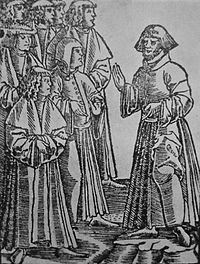Petr Chelčický
| Petr Chelčický | |
|---|---|

Peter Chelčický talking with masters of the University of Prague
|
|
| Born | c. 1390 AD Chelčice, Bohemian Kingdom (present-day Czech Republic) |
| Died | c. 1460 AD Chelčice |
| Era | Medieval philosophy |
| Region | Western Philosophy |
| School | Pacifism, Anarchism |
|
Main interests
|
Religion, Family |
|
Notable ideas
|
Non-violence |
|
Influences
|
|
Petr Chelčický (Czech pronunciation: [ˈpɛtr̩ ˈxɛltʃɪtskiː]) (c. 1390 – c. 1460) was a Czech Christian spiritual leader and author in 15th century Kingdom of Bohemia (modern Czech Republic). He was one of the most influential thinkers of the Bohemian Reformation.
His published works concentrated on critique of immorality and violence of the contemporary church and state. He proposed a number of Bible-based improvements for human society, including nonresistance, which influenced such luminaries as Tolstoy, Gandhi, and M.L.King. Paradoxically, the main part of the Hussite movement rejected his teachings in favour of nonviolence and avoidance of politics, which led to much violence among the Hussite movement in the end. Chelcicky's teachings laid the foundation of the Unity of the Brethren.
Petr Chelčický is thought to have been born in southern Bohemia in about 1390, although one theory puts his birth as early as 1374. Very little is known about his personal history. Different historians have called him a serf, an independent farmer, a squire, a nobleman, a cobbler, a priest, and a Waldensian. On one occasion, Chelčický called himself a peasant, but this description is at odds with his ability to live in Prague from 1419–1421, his rudimentary knowledge of Latin, and the time he was able to devote to literary, political, and religious pursuits. It is certain that he was unusually literate for a medieval man without a regular academic education. After 1421 he lived and farmed in the village of Chelčice, near Vodňany. He produced 56 known works, but the majority remain unpublished and inaccessible except in the original manuscripts. His thinking was influenced by Thomas of Štítný, John Wycliffe, Jan Hus, and the Waldensian tradition. He died around 1460.
...
Wikipedia
